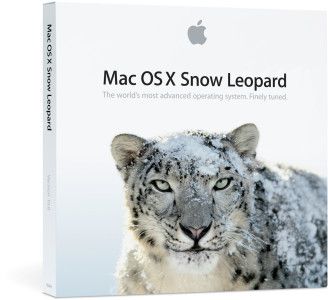From our front-page news:
When Apple's "Snow Leopard" operating system hit the market in late August, it promised some big things, despite offering such a small feature-set. The goal wasn't to bombard consumers with new features, but rather deliver a much faster OS experience, and that was pulled off thanks to the fact that it was almost completely re-written. Since its launch, however, Snow Leopard hasn't been the most well-received, for a few reasons.
The most "minor" of them all was due to the lack of that new OS feeling... there just wasn't much to savour. For those who purchased it thinking otherwise, no one could be blamed but themselves, because no one claimed it was to deliver numerous new features, and the price tag, at $29, proved it. That's the minor issue... the major issue(s) come down to bugs, and a fair number of them. While most are mild in their overall effect, there's one that lingers that has the ability to cause some major headaches for consumers.
In short, the bug can result in lost data, and from what I can tell, it's specific to the user's home folder. That's the scary part... the even scarier part is knowing just how easy it is to pull it off. The process is as simple as logging into the guest account, and then back into your own. That's all. According to Apple, the effect is rare, but there have been reports of it occurring ever since the OS' launch. Apple is investigating deeper, and I'd assume that a patch to correct the issue will be released as soon as possible.
You have to appreciate the irony of such a bug, because Apple has been extremely vocal over the years of just how secure its OS is compared to the competition (Windows). Yet, here's a bug that's obscenely simple to pull off, and it could potentially render all data in your home folder vanished. I'm not familiar enough with Mac OS X's file system to know if data could be easily recovered, but if it's anything like most Linux file systems, the chances of recovery are ridiculously slim.

"When I logged into my MacBook Pro this morning, it was as if I had logged into my Guest Account and not my standard user profile," user parshallnet said. "No icons on the desktop, the desktop wallpaper was the default 'space' photo and not the one I had assigned, no documents in the docs folder, apps behaved as if I'd never opened them before." The issue was initially reported when Snow Leopard first launched, but complaints have grown as adoption of the platform has continued. Monday, Engadget highlighted the issue.
Source: Apple Insider
The most "minor" of them all was due to the lack of that new OS feeling... there just wasn't much to savour. For those who purchased it thinking otherwise, no one could be blamed but themselves, because no one claimed it was to deliver numerous new features, and the price tag, at $29, proved it. That's the minor issue... the major issue(s) come down to bugs, and a fair number of them. While most are mild in their overall effect, there's one that lingers that has the ability to cause some major headaches for consumers.
In short, the bug can result in lost data, and from what I can tell, it's specific to the user's home folder. That's the scary part... the even scarier part is knowing just how easy it is to pull it off. The process is as simple as logging into the guest account, and then back into your own. That's all. According to Apple, the effect is rare, but there have been reports of it occurring ever since the OS' launch. Apple is investigating deeper, and I'd assume that a patch to correct the issue will be released as soon as possible.
You have to appreciate the irony of such a bug, because Apple has been extremely vocal over the years of just how secure its OS is compared to the competition (Windows). Yet, here's a bug that's obscenely simple to pull off, and it could potentially render all data in your home folder vanished. I'm not familiar enough with Mac OS X's file system to know if data could be easily recovered, but if it's anything like most Linux file systems, the chances of recovery are ridiculously slim.

"When I logged into my MacBook Pro this morning, it was as if I had logged into my Guest Account and not my standard user profile," user parshallnet said. "No icons on the desktop, the desktop wallpaper was the default 'space' photo and not the one I had assigned, no documents in the docs folder, apps behaved as if I'd never opened them before." The issue was initially reported when Snow Leopard first launched, but complaints have grown as adoption of the platform has continued. Monday, Engadget highlighted the issue.
Source: Apple Insider
